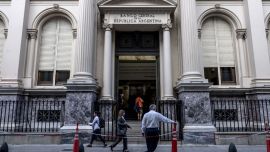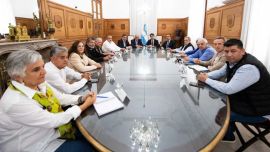Peaceful protesters overshadowed by media's focus on violent few. The disappearance of Santiago Maldonado remains the topic in Argentina, as the story continues its domination of the local media. Last week’s huge rally in the Plaza de Mayo (which took place as this publication went to print last week) drew international attention as the story of the missing 28-year-old took up column inches across the world. Yet much of the local media chose to focus on the actions of a violent minority, perhaps a result of the unhalting search for news about a case that has been covered from almost every angle yet lacks any firm evidence in its investigations. This week, the Times looks at the story and offers analysis and opinion. More inside.
Indigenous land law faces unresolved future. Some things slip past the spotlight. Eleven years ago, Congress passed Law 26.160, which established that a land survey should take place of indigenous ancestral lands and that the eviction of those occupying disputed land be suspended for four years. The law expires November 23 and despite several deferrals, only 30 percent of those lands have been surveyed. During last Thurday’s session, however, the Sente voted 33 to 11 to postpone a decisión on the issue until a later date. With mid-term elections set for October 22, there’s no guarantee that the Senate will now meet and decide to vote on the issue before the deadline. If the law expires, some 70 percent of indigenous lands will lack the legally required land survey and occupiers could be vulnerable to eviction.
Milani to face trial. At press time last night, it emerged that ex-Army chief César Milani will be sent to trial on charges of illicit enrichment.
Red Cross exhumes 121 bodies on Malvinas. The Red Cross confirmed this week it had finished exhuming the bodies of 121 fallen Argentine soldiers buried in a cemetery on the Malvinas (Falkland) Islands, as part of an international-led effort to identify the bodies.
An expert mission sent by the International Committee of the Red Cross (ICRC) said the remains of 121 bodies had been removed from the ground, despite the cemetery having 123 crosses. The work to identify the bodies of Argentine servicemen who were killed in the 1982 war with Britain is part of an agreement reached between the two governments.
“The exhumation phase is over, we have moved faster than we had anticipated,” said Laurent Corbaz, the head of the ICRC project at a press conference in Buenos Aires.
“Half the samples have been analysed and the DNA is in a good condition that will allow us to establish a genetic profile. We are optimistic that a good proportion of the soldiers will be identified,” Corbaz added.
Samples from the bodies will now be sent a laboratory in Córboba province, where the attempts to identify the remains will continue. The results will be double-checked in the UK and Spain.
“We expect to have all the results of the analysis by the end of September to begin the identification in October,” Corbaz said. “We intend to send reports to the Argentine authorities in November.”
Del Potro rolls back the years in US Open. Juan Martín del Potro has had many ups and downs in his career and his battles with injuries are well-known. But in a week that has brought forth little good news, DelPo’s courageous performance against five-time champion Roger Federer at the US Open this week – just 48 hours after a gruelling match against Dominic Thein – gave us a reason to smile. Unfortunately, Del Potro’s clash with Rafael Nadal was ongoing at press time last night but whatever the result, the Argentine has given us another memorable match to cherish.
More court trouble for Cristina. Federal prosecutor Gerardo Pollicita on Thursday asked Judge Claudio Bonadio to summon former president Cristina Fernández de Kirchner to answer allegations by late AMIA special prosecutor Alberto Nisman that she conspired with Iran to cover up Tehran’s role in the 1994 terrorist bombing of the AMIA Jewish community centre.
The charges centre on the 2013 Memorandum of Understanding signed with Iran. To justify the summons, Pollicita argued that new evidence had emerge in the form of at least two telephone calls between picket leader Luis D’Elía and an Iranian contact from the Pink House just before the pact was signed.
Among other arguments, the prosecutor also quoted the words of CFK’s former foreign minister and current senatorial running mate Jorge Taiana against her. Taiana had earlier said that Iran had made similar overtures to CFK’s late husband and predecessor Néstor Kirchner but that they had been consistently rejected during his 2003-2007 presidency.
Pollicita also requested that 13 other people be summoned for questioning, including D’Elía, former foreign minister Héctor Timerman, La Cámpora Kirchnerite youth leader Andrés “Cuervo” Larroque and former Quebracho extremist leader Fernando Esteche, as well as former Foreign Ministry officials and intelligence agents.
The prosecutor also requested that all 14 be barred from leaving the country, as well as having a lien slapped on their assets.
At the time Fernández de Kirchner and her minister Timerman argued that the memorandum was a new way of seeking justice for the 85-death AMIA terrorist atrocity but Nisman (who was found dead in his Puerto Madero flat in January, 2015, of a gunshot wound to the head) argued that the real aim of the negotiations was to lift the Interpol red notices against several Iranian officials.

























Comments